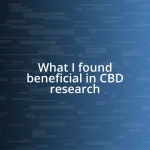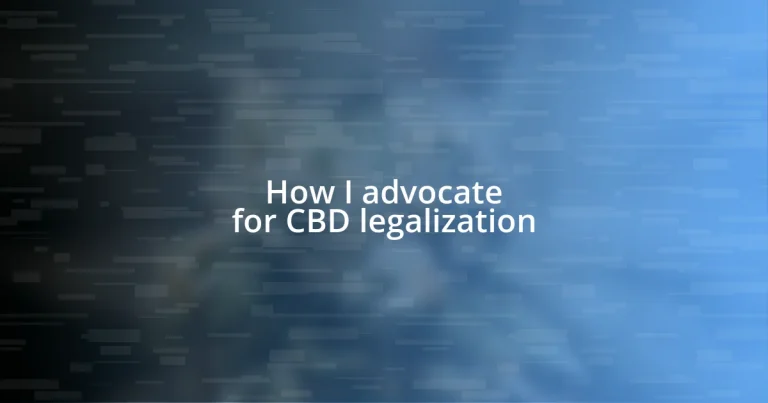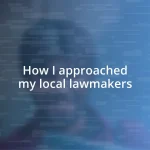Key takeaways:
- CBD is distinct from THC and offers health benefits, prompting the need for comprehensive legalization due to varying state regulations.
- Advocacy efforts can create job opportunities, combat misinformation, and educate the public on CBD’s therapeutic potential.
- Engaging with local legislators and building community networks are vital for effective advocacy, as personal stories can foster meaningful connections and influence policy change.
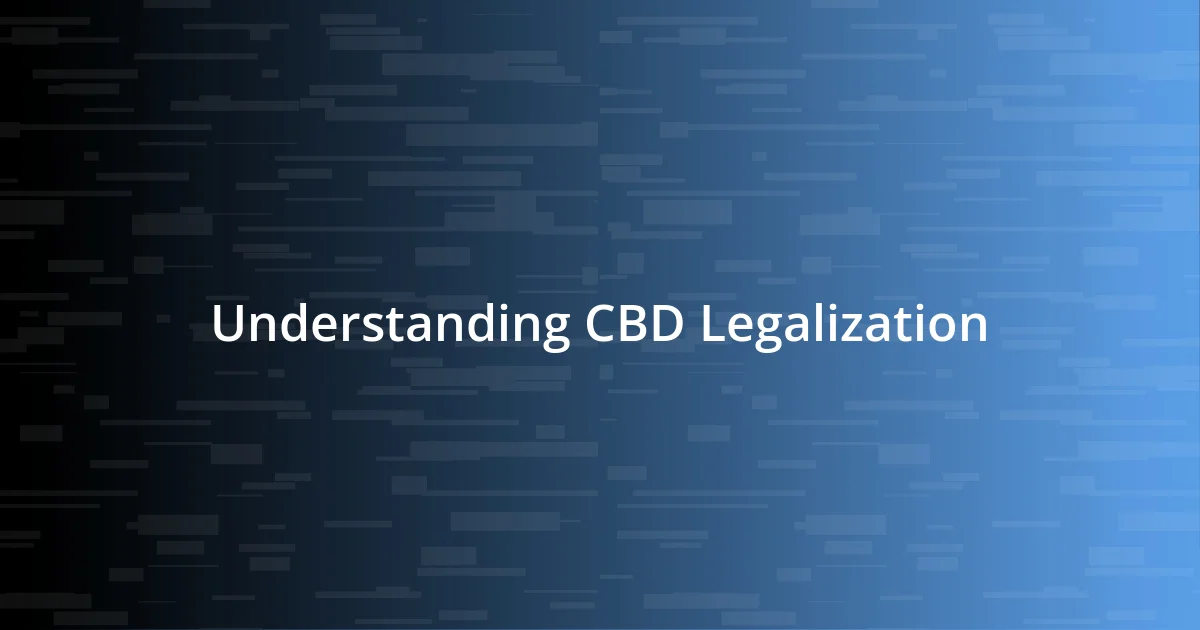
Understanding CBD Legalization
CBD legalization is a nuanced topic that often confuses many people. I remember having a conversation with a friend who thought all cannabis was the same. It’s essential to clarify that CBD, or cannabidiol, is distinct from THC, the psychoactive compound found in marijuana. This distinction matters greatly when discussing its legal status.
When I first learned about CBD’s potential benefits, like helping with anxiety and pain relief, I was thrilled. However, I was also frustrated by the varying regulations across states. How is it that something with so much promise can be treated so differently from one place to another? The inconsistency often leaves both consumers and advocates in a state of uncertainty, which only fuels the need for comprehensive CBD legalization.
The emotional weight of a loved one suffering from chronic pain really hit home for me. It was heartbreaking to see them struggle while safe, effective alternatives like CBD remained locked in legal limbo. This personal experience is what drives my advocacy; it highlights the urgent need for clear, fair regulations to protect those who could find relief from this remarkable compound.
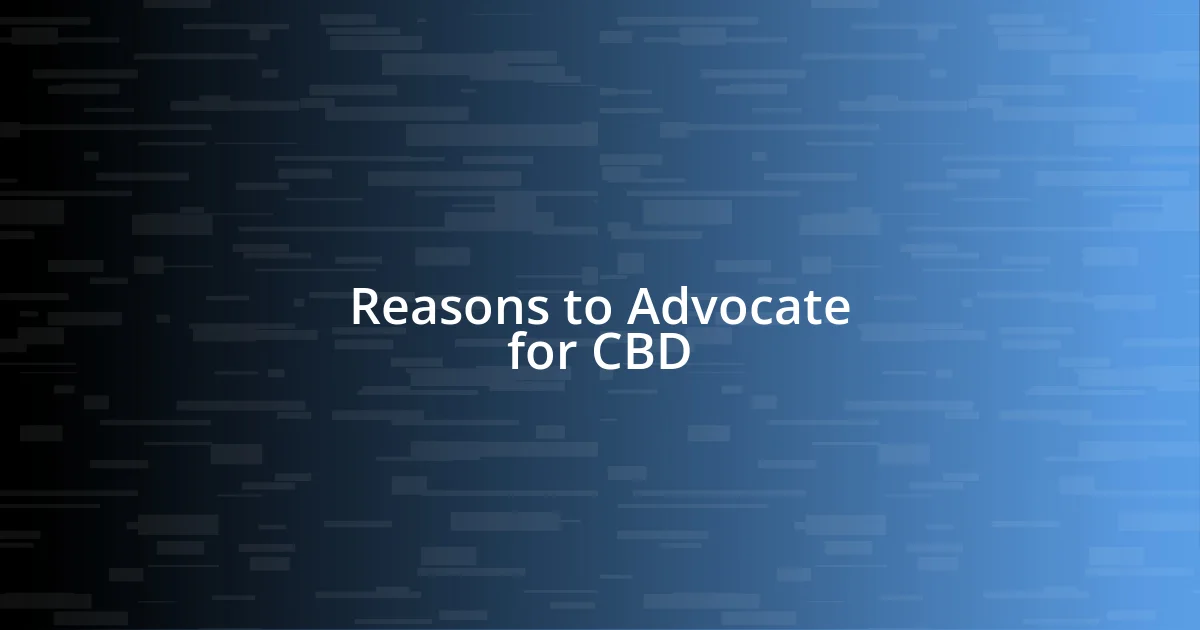
Reasons to Advocate for CBD
Advocating for CBD legalization is crucial because it offers numerous health benefits backed by research. For example, I’ve heard numerous testimonials from individuals who experienced significant relief from conditions like epilepsy and severe anxiety after using CBD. This isn’t just anecdotal; studies have shown that CBD can reduce seizure frequency and provide calming effects, which opens the door for its use as a legitimate treatment option.
Another essential reason to advocate for CBD is its potential to boost the economy. By legalizing CBD, we create new job opportunities in agriculture, manufacturing, and retail sectors. I remember speaking with a local farmer who transitioned to hemp farming, expressing how it transformed his business and created jobs in our community. These stories are a reminder that economic growth goes hand-in-hand with progressive legislation.
Lastly, the stigma surrounding CBD and cannabis as a whole contributes to misinformation that can harm individuals seeking relief. I often engage in conversations where people equate CBD with illicit drugs, and it frustrates me. Education is key—by advocating for legalization, we can provide accurate information and help dismantle these misconceptions, paving the way for a more informed society that prioritizes health over outdated views.
| Reason | Details |
|---|---|
| Health Benefits | CBD has shown significant efficacy in managing conditions like epilepsy and anxiety. |
| Economic Growth | Legalization opens new job opportunities, enhancing local economies. |
| Misinformation Reduction | Advocating allows for accurate education to combat stigma and promote understanding. |
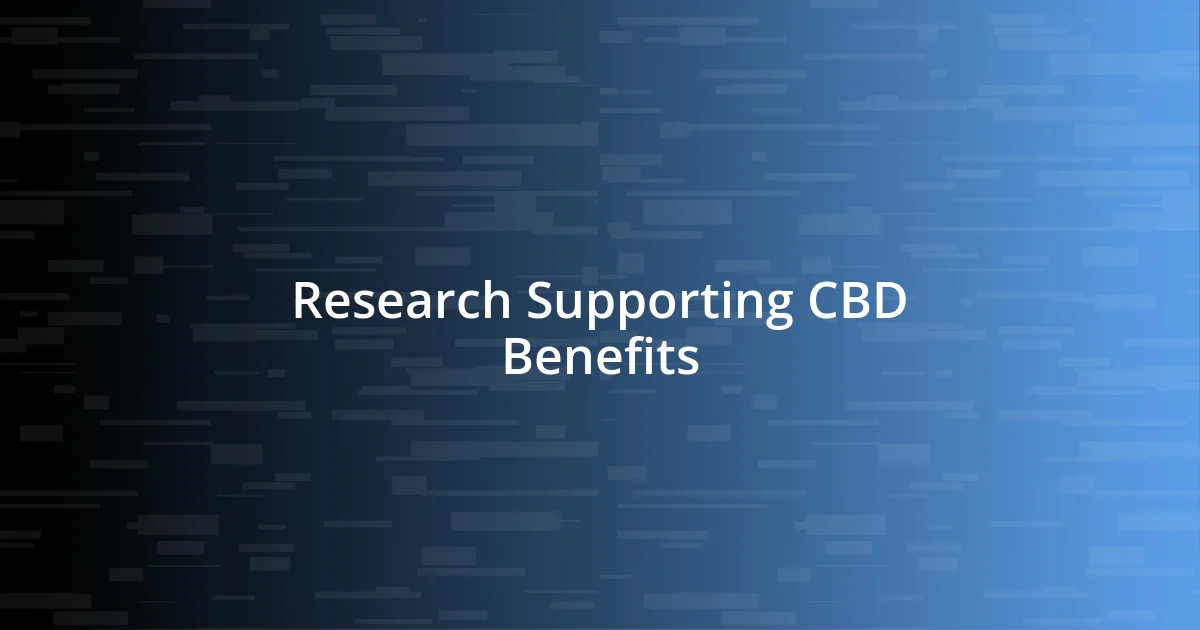
Research Supporting CBD Benefits
Research shows that CBD may provide a range of health benefits, which is why I find myself passionately advocating for its legalization. For instance, I recall a heartwarming story from a friend who struggled with anxiety. After incorporating CBD into their daily routine, they experienced a noticeable reduction in their symptoms. This personal transformation illustrates how scientific findings can have profound real-world impacts.
Here’s a snapshot of key research supporting CBD’s benefits:
- Epilepsy Management: Studies have demonstrated that CBD can significantly reduce the frequency of seizures, particularly in treatment-resistant epilepsy.
- Anxiety Relief: Clinical trials suggest that CBD can alleviate anxiety in both acute and chronic settings, providing a non-psychoactive option for those seeking relief.
- Pain Management: Research indicates that CBD may help in managing pain related to conditions like arthritis and multiple sclerosis, potentially reducing reliance on pharmaceuticals.
- Sleep Disorders: Some evidence points to CBD’s effectiveness in improving sleep quality, especially for those with insomnia or PTSD.
When I first learned that CBD could help people with such varied issues, I felt a spark of hope for those struggling with conditions that often feel insurmountable. It’s incredible to think about how this compound, derived from hemp, can offer a lifeline for many. The potential for CBD to transform lives is not just scientifically backed; it’s a reality reflected in the stories of individuals who, like my friend, have found relief and comfort through its use.
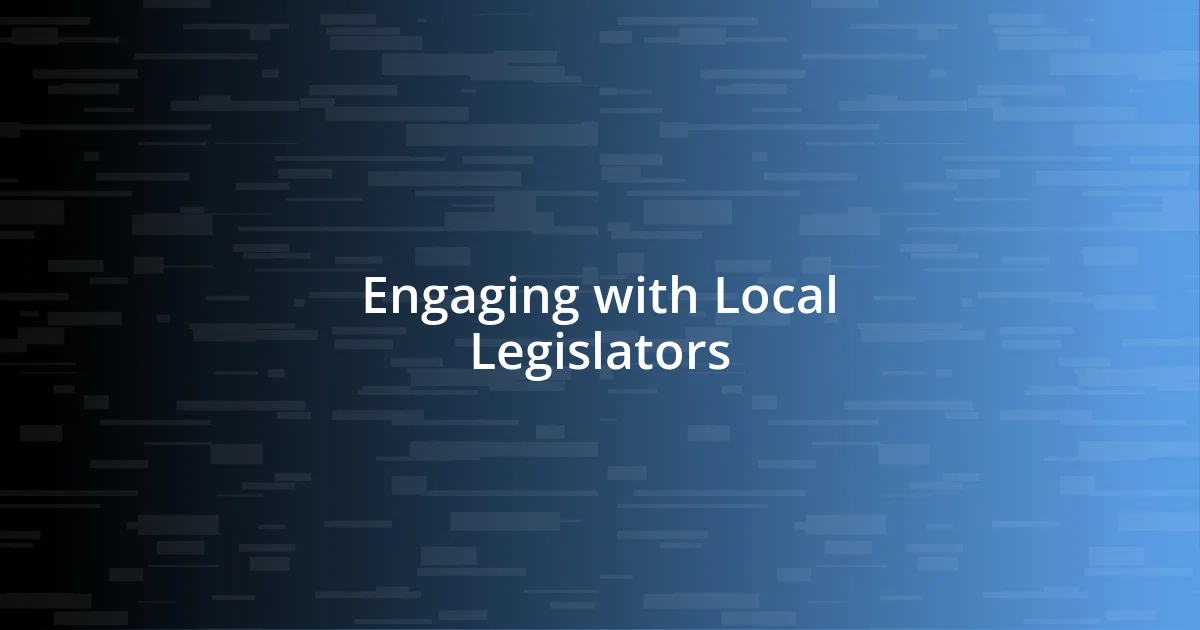
Engaging with Local Legislators
Engaging with local legislators is a crucial step in the advocacy process. When I first reached out to my state representative, I found that personal stories resonate deeply. I remember sharing how CBD helped a family member manage chronic pain, transforming their quality of life. That genuine emotional connection often opens doors and fosters a productive dialogue.
I typically suggest organizing community events where constituents can share their experiences with CBD. I hosted a small gathering once where people told their stories of healing. Seeing firsthand how passionate individuals are can be incredibly impactful for lawmakers, compelling them to listen and act.
Additionally, I’ve realized the importance of being informed about legislative processes and proposals. When I approached my local legislators, I came equipped with facts about CBD’s benefits and economic potential. I often wonder—what if every advocate took the time to understand the opposition’s concerns? Armed with knowledge and empathy, we can build stronger arguments that address those fears while emphasizing the positive outcomes of legalization.
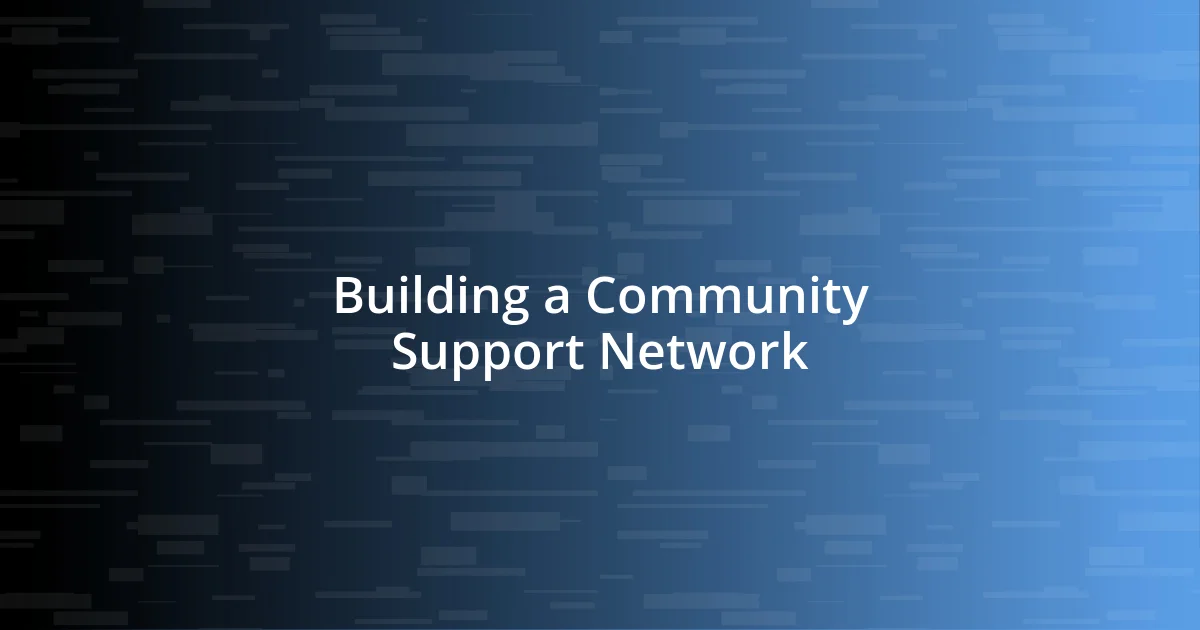
Building a Community Support Network
Building a community support network is essential for any advocacy initiative. I recall attending a local health fair where I met like-minded individuals eager to share their experiences with CBD. It was invigorating to witness the collective determination in the room, each story intertwining to create a supportive tapestry of shared goals and aspirations.
It’s during these gatherings that connections flourish. I remember when a participant mentioned they were struggling to find accurate information about CBD. That led us to create an online group where people could exchange resources and experiences. Establishing a safe space for open dialogue not only empowers individuals but also strengthens the movement as a whole. How powerful can a community be when everyone lifts each other up?
I often emphasize outreach beyond familiar faces, inviting diverse voices into the conversation. One time, I spoke with a local yoga instructor who had seen great benefits from CBD for her students. We collaborated on a workshop that highlighted both CBD and wellness practices, attracting attendees from various backgrounds. By broadening our network, we create a ripple effect that can inspire and educate even more people about the importance of CBD legalization.
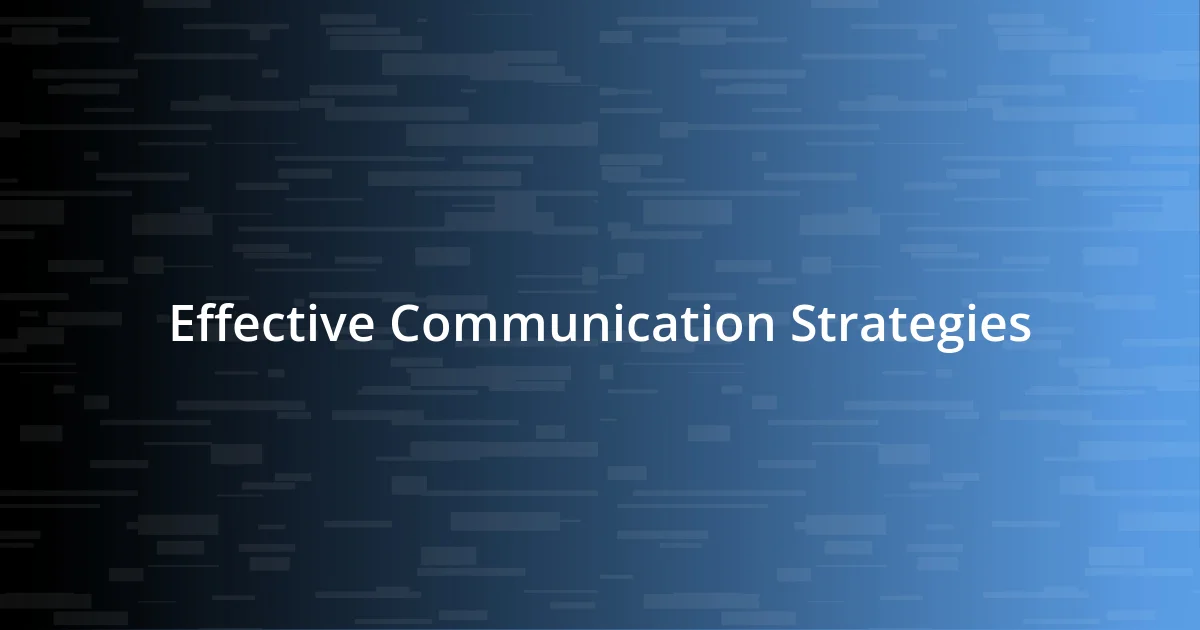
Effective Communication Strategies
Effective communication in CBD legalization advocacy goes beyond just presenting facts; it’s about crafting a compelling narrative. I remember a moment at a town hall meeting when I shared my own journey with CBD as a stress-relief tool. The reactions from the audience were palpable—people were nodding, whispering, and even sharing their own stories. That emotional exchange created a connection that statistics alone couldn’t achieve. Isn’t it fascinating how a single personal story can spark a broader conversation?
I’ve also found that adapting my communication style to fit the audience is crucial. During a presentation to a local business group, I focused on the economic benefits of CBD legalization, highlighting how it could create jobs and boost local businesses. By speaking their language, I saw how quickly the room shifted from skepticism to enthusiasm. I constantly reflect on how powerful it is when we tailor our message—not just to inform, but to resonate. What if we could reach even more people by understanding their perspectives first?
Listening is as much a part of communication as speaking. I make it a practice to invite feedback during discussions, whether in person or through social media. One time, a fellow advocate expressed concern about the potential health risks associated with CBD. Instead of dismissing those worries, I engaged with her openly, discussing how research addresses those aspects. This not only built trust but also turned an opponent into a supporter. Wouldn’t it be amazing if every conversation created opportunities for learning and connection?
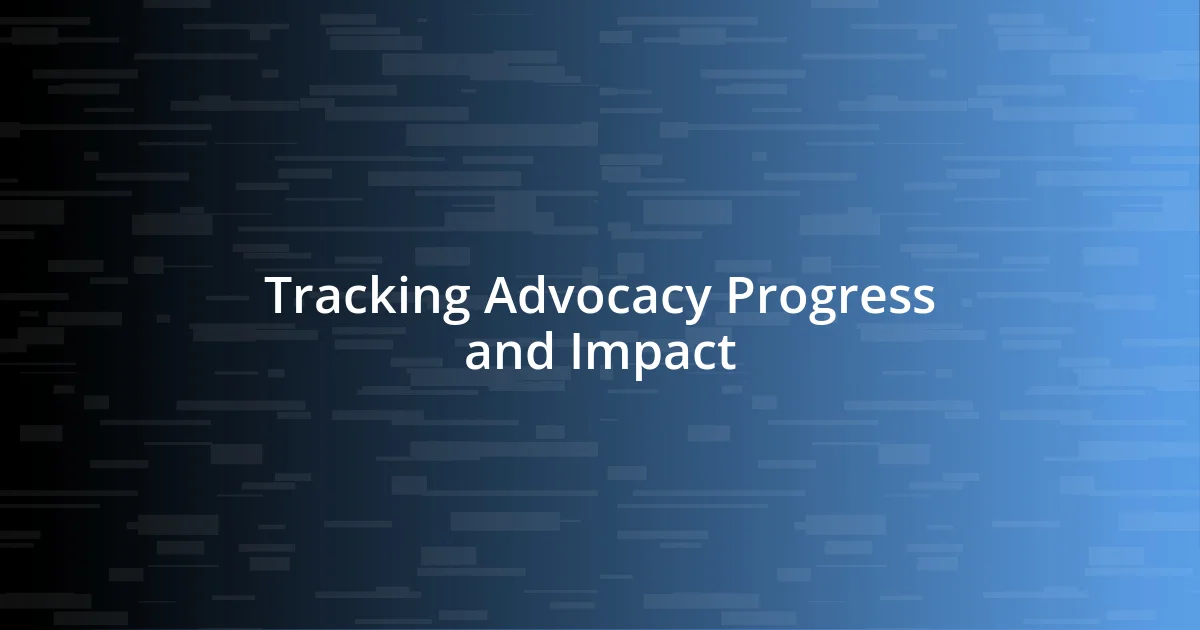
Tracking Advocacy Progress and Impact
Tracking the progress and impact of advocacy efforts is critical to understanding where we stand and how we can improve. I remember receiving feedback from attendees after a community meeting. Many shared how my insights had changed their views on CBD, reflecting a palpable shift in perception. Seeing firsthand the tangible effects of our dialogue was both humbling and motivating. How often do we pause to celebrate these small victories that can lead to significant change?
I also make it a priority to gather data on our outreach initiatives. For instance, when we launched an awareness campaign on social media, I tracked the number of shares and comments. The resulting surge in engagement revealed just how much interest there is in the community. It’s fascinating to realize that numbers can tell such personal stories. It excites me to think about how this kind of data can guide future strategies, ensuring we’re meeting people where they are.
Lastly, I often engage with local lawmakers to discuss the impact of our advocacy. One particularly memorable meeting was with a state representative who shared how constituents’ stories had influenced their stance on CBD legislation. Our conversation reinforced the idea that advocacy is a two-way street—listening to policymakers’ insights helped refine our messaging. What if we could build more of these bridges? Each connection not only advances our cause but enriches our understanding of the landscape we’re navigating.









